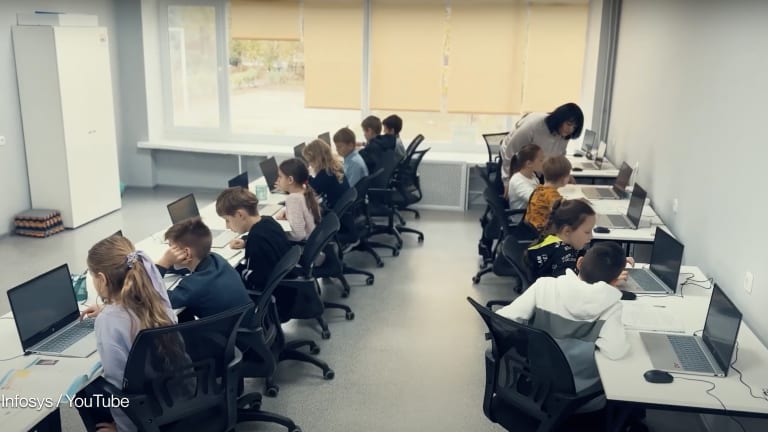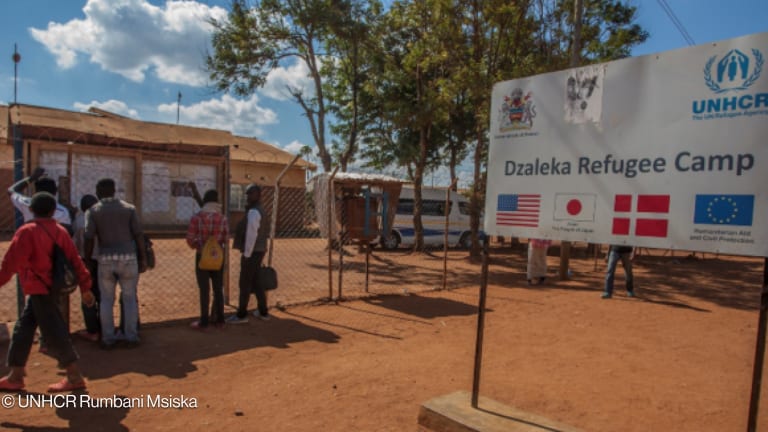
Every year, billions of dollars are spent on humanitarian aid to assist people caught up in war and disaster. This international assistance is often the only available lifeline, particularly when governments are embroiled in conflict or national budgets can’t cope with the magnitude and severity of needs on the ground.
When these crises persist over time, which they so often do, humanitarian budgets are expected to continue supporting people and communities for years, sometimes even decades.
Taking a leap now could save billions of dollars in the long term, lead to real political progress, and show concrete improvements in the lives of millions of displaced families.
—This creates two problems. First, using what is meant as short-term, lifesaving aid to respond to protracted crises is profoundly unsustainable. Second, this approach offers little incentive for governments to take responsibility for finding solutions to these crises.
These challenges can only be tackled through more forward-looking planning, sustained investment, and broad collaboration. And this can only happen if humanitarian money gives way to longer-term development funding.
But for this, the incentives need to change.
Two years ago, the United Nations secretary-general established a high-level panel to put forward recommendations for more effective responses to displacement happening inside countries’ borders. The panel, which benefited from the inclusion of political leaders among its members, submitted its report last month and called for a fundamental shift in how the international community responds to situations of protracted displacement.
The issue of political will and capacity were recognized as critical for making progress on this issue.
Every government in the world is juggling competing demands and priorities. Their willingness and ability to meet the needs of their displaced populations are constrained by the vested interests and demands of various constituencies. Prioritizing one issue over another requires understanding these dynamics and finding new leverage points.
There are ways to change the political calculus. The prospect of accessing new resources — not only financial but also technical and human — and the opportunity to be a model for others can be a powerful motivation. Many government representatives consulted during this process said they wanted to be supported and equipped to design their own solutions, learn from others, and develop new capacities.
With this in mind, one of the panel’s main recommendations is for donors and investors to create a Global Fund for Solutions to Internal Displacement. This fund would work in partnership with governments, the private sector, financial institutions, and local civil society to find sustainable solutions to protracted displacement crises.
It would focus on providing governments with financial and technical assistance to implement their own durable solutions, strategies, and national development plans, aimed at having as much concrete impact on people’s lives as possible. Funded projects would create jobs and livelihood opportunities, and provide housing support or education services for internally displaced people.
Ultimately, the goal of the fund would be to give people a pathway out of dependency and to strengthen public systems and services to reduce reliance on international aid. It would place governments in the driving seat and equip them with the resources they need to drive a common vision.
There are successful precedents for such a fund — for example, the Global Fund to Fight AIDS, Tuberculosis and Malaria. As with the displacement fund, access to resources would come with strict conditions and eligibility criteria. Governments would need to work with the Global Fund on solutions to internal displacement to develop an effective strategy, with concrete and measurable results, and commit to working with local communities, civil society, and the private sector to implement it.
They would be subjected to a rigorous monitoring and evaluation system to ensure resources are used well and mutually agreed results can be tracked. The displacement fund would also offer a platform for peer-to-peer learning and exchange, and ensure that good practices from around the world can be captured and shared.
The fund would certainly not be a quick fix that can be rolled out in all contexts. But it could help kickstart a new way of working in countries that host long-standing displaced populations and where the government has shown willingness to take action. Over time, we hope it would help ensure that humanitarian aid can be preserved for the crises where it is most needed.
For the fund to succeed — or even get off the ground — it will need investors with long-term vision. With the world still grappling with the economic impacts of the COVID-19 pandemic, convincing donor governments to invest in a new fund will be challenging.
High-level panel calls for new global fund for internally displaced
The U.N. Secretary-General’s High-Level Panel on Internal Displacement looked to the Global Fund to Fight AIDS, Tuberculosis and Malaria for inspiration. But donors aren't convinced.
We do, however, believe that urgent action is needed now — and that more of the same is simply no longer enough. At the end of 2020, 55 million people worldwide were living in prolonged internal displacement. Without a strong push for solutions, their situation is unlikely to improve. Today, the global economic cost of internal displacement already amounts to $20.5 billion and this is still considered a significant underestimate.
Taking a leap now could save billions of dollars in the long term, lead to real political progress, and show concrete improvements in the lives of millions of displaced families. We hope that over the coming weeks and months, the international donor community can mobilize to make this new fund a reality.









